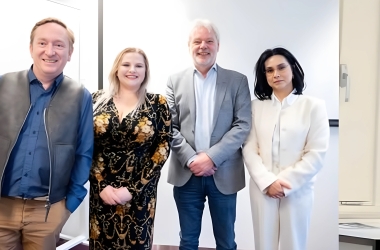Graduation Assignment Analyses Motivations Behind Dark Tourism

Samantha Bihl’s Study Focuses on Cape Town Holocaust & Genocide Centre, South Africa
An often overlooked aspect of tourism is 'dark tourism', which involves travel to places historically associated with death and tragedy. Many sites, such as former concentration camps, battlefields and prisons, have been transformed into museums where visitors can learn from the horrors of the past, with the aim of raising awareness and preventing dark times from returning.
One such place is the Cape Town Holocaust & Genocide Centre, which South African Wittenborg graduate Samantha Bihl has visited several times since childhood. Inspired by these experiences, Samantha, who recently completed a bachelor’s degree in Hospitality Business Administration, chose to write her graduation assignment on the factors that motivate people to visit the museum.
She explains that one of the most important aspects of the Cape Town Holocaust & Genocide Centre is that admission is completely free. “I love the impact it has not only on the local community but also on the international community, so I decided to understand the reasons why people visit this site. The museum’s main focus is the Holocaust, but it also features exhibits on other genocides and atrocities such as the apartheid regime in South Africa.”
Samantha opted for a quantitative method, using an online survey to gather information for her study. In collaboration with the museum, she printed a QR code linking to the questionnaire and affixed it to a wall at the building’s entrance. The centre’s staff also contributed by explaining to visitors how to fill out the survey.
In total, 131 people answered the questionnaire. The researcher highlights that, within her sample, most of the people who visited the museum were located in the Cape Town area and were at the centre for the first time. “Their main motivation was to empathise with the victims of the Holocaust, followed by curiosity about the unusual and their own personal reasons. What surprised me the most was that not a single person selected the option indicating an attraction to the macabre, even though the survey included it. I thought this would have been a strong reason, as attraction to the macabre is one of the motivations for dark tourism.”
The study reveals that, while factors such as the museum’s restaurant and workshops were not considered particularly relevant by visitors, the staff’s friendliness was viewed as very important. “When you’re going through such a profound museum, which can sometimes trigger strong feelings, it is important to have friendly staff who can help, answer questions and guide you on what happened,” Samantha points out.
According to the graduate, the fact that the survey was as anonymous as possible encouraged some respondents to share very personal connections to the theme of the museum. “One person said that their grandmother was part of the Dutch resistance in the 1940s and had to endure the pure atrocities that took place at that time. Others shared that they had lost family members during the Holocaust and wanted to feel close to them again.”
Samantha says that, eventually, she would like to expand her research to other dark tourism sites in order to understand the similarities and differences in the factors that lead people to visit these places.
For her, the most rewarding aspects of working on her graduation assignment were connecting with people on a deeper level and learning more about a type of tourism that is not widely researched. She encourages current Wittenborg students working on their graduation assignments to make the most of their supervisors’ guidance and choose research topics they feel connected to.
“You will be doing many hours of research, and if you pick something you don’t like, those hours will feel like hundreds of years. Also, choose a research topic that is not overly researched – something that is feasible, but not what everybody else is doing. Finally, don’t leave anything to the last minute. There’s already enough stress with this assignment,” she concludes.
WUP 19/05/2025
by Ulisses Sawczuk
©WUAS Press